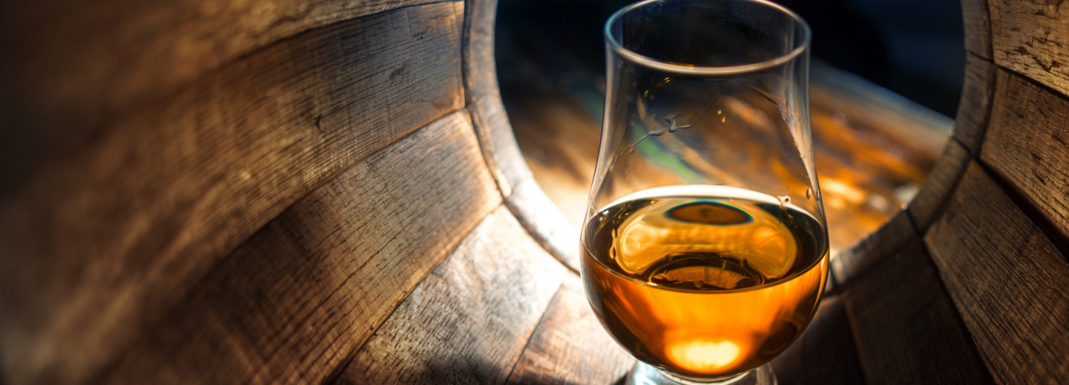Although, there are whisky distilleries in many countries around the world, Whisky is largely associated with Scotland and Ireland. A variety of different grains are used depending on availability and the particular flavour profile the distiller looks to achieve.
Many places in the world make a Scottish style malt whisky adapted to their own local conditions. Whisky production is strictly regulated around the world with each region defining whisky in different ways. Scotch whisky regulations can be found here: http://www.legislation.gov.uk/uksi/2009/2890/contents/made.
The Irish Whiskey regulations can be found here: http://www.irishstatutebook.ie/eli/1980/act/33/enacted/en/print.html.
Production : the whisky production involves 5 key stages:
- Milling : involves the grinding of the grain into a flour-like substance : the grist; its composition has an impact on downstream processing
and ultimately flavour of the final product. - Mashing : the grist is mixed with hot water; the time of mashing and the temperature of water are important
- Fermentation : Following the conversion of starch into fermentable sugars through enzymatic action, the wort, is pumped into a fermentation vessel (washback). At this point selected yeast is added and fermentation begins; it will last between 45 and 110 hours, dependent on the desired flavour profile of the final spirit you want.
- Distillation: At the end of fermentation the liquid : the wash, is transferred to a wash receiver in preparation for distillation; The various components of the wash such as ethanol, water and flavour congeners have different boiling points which allows the distiller to preferentially select the compounds of interest. The distillation technique used will impact also the profile of the new make spirits.
- Maturation: it takes place after the distillation, in oak barrels and tends to bring aromas, flavours as well as conferring colour. Scotch whisky and Irish Whiskey must both be matured for a minimum of 3 years.
According the cereal you use, the process you follow, and the whisky you want to produce, Lallemand Distilling proposes yeast suitable for each application. All the different strains we propose, have been selected in Whisky areas production and ferment maltose, maltotriose and derivates.
DistilaMax MW produces complex whisky Scottish style, this strain is also very interesting on rye.
DistilaMax XP ferments malted grain; this strain is temperature tolerant and produces esters even at temperature over 32°C.
DistilaMax NT ferments malted and un-malted grain, this strain is temperature tolerant.
DistilaMax GW produces aromatic whisky from un-malted grain only or from a mix of malted and un-malted grain.
Even if on grain the lack of vitamins and minerals is not usual, we recommend to use a dedicated nutrition –where the nutrition is allowed- of the range DistilaVite in the rehydration and in fermentation in order to get a clean end of fermentation , a good kinetic of fermentation and the expected aromas.
If you have any question, please, do not hesitate to contact our Technical Team who will be happy to assist you.
-
DistilaMax® XP
DistilaMax® XP has been selected especially for its ability to ferment maltose, maltotriose and other sugars in malted grain feedstock. DistilaMax® XP displays a good temperature tolerance and performs well at temperatures up to 36°C. DistilaMax® XP exists worldwide in dry […][ Read more ] -
DistilaMax® MW
DistilaMax® MW has been selected especially for its ability to ferment maltose, maltotriose and other sugars of malted barley feedstock. DistilaMax MW displays a good alcohol tolerance and performs very well up to 15% v/v. DistilaMax MW is recommended for […][ Read more ] -
DistilaMax® GW
DistilaMax® GW is an active dry yeast and is recommended for use in the production of grain Whisky by fermentation of wort made from wheat or maize. It contains a selected strain of Saccharomyces cerevisiae distillers’ yeast in a highly […][ Read more ] -
DistilaMax® NT
Widely used in Scotland, DistilaMax NT is recommended for use in the production of whisky, by fermentation of wort made from malted barley or grain feedstock. DistilaMax NT produces a congener profile that is well-suited to malted barley whisky such […][ Read more ] -
DistilaBact® LP
DistilaBact ® LP is a Lactiplantibacillus plantarum specifically for use in managing sour mash development during the production of distilled spirits. DistilaBact LP is easy to use and can be added directly into the mash either as a co-inoculation with […][ Read more ] -
The Alcohol Textbook
The Ethanol Technology Institute, led by Scientific Director Dr Graeme Walker, publishes The Alcohol Textbook and conducts both The Alcohol School and Biofuels Academy. The 6th Edition of The Alcohol Textbook is now available. There is no better tool for […][ Read more ] -
DistilaVite®
During the process of alcoholic fermentation yeast, which is a complex living organism, is subject to various stressors: temperature, ethanol, pH, organic acids and others. In order to get a successful fermentation, yeast needs a balanced nutrient package which will maximize its potential […][ Read more ] -
DistilaZyme® GA
DistilaZyme® GA is a selected gluco amylase (amyloglucosidase) enzyme capable of hydrolyzing α-1,6 and α- 1,4 glucosidic linkages of short chain dextrins to fermentable sugars to be uptaken by the yeast during the fermentation process. DistilaZyme GA optimizes the conversion […][ Read more ] -
DistilaZyme® AA
DistilaZyme® AA is an alpha amylase enzyme selected especially for its ability to break mash viscosity by gelatinization and converting of starch into dextrin chains in the cooking / mashing process. DistilaZyme AA can be used on whole grain mashes […][ Read more ]

